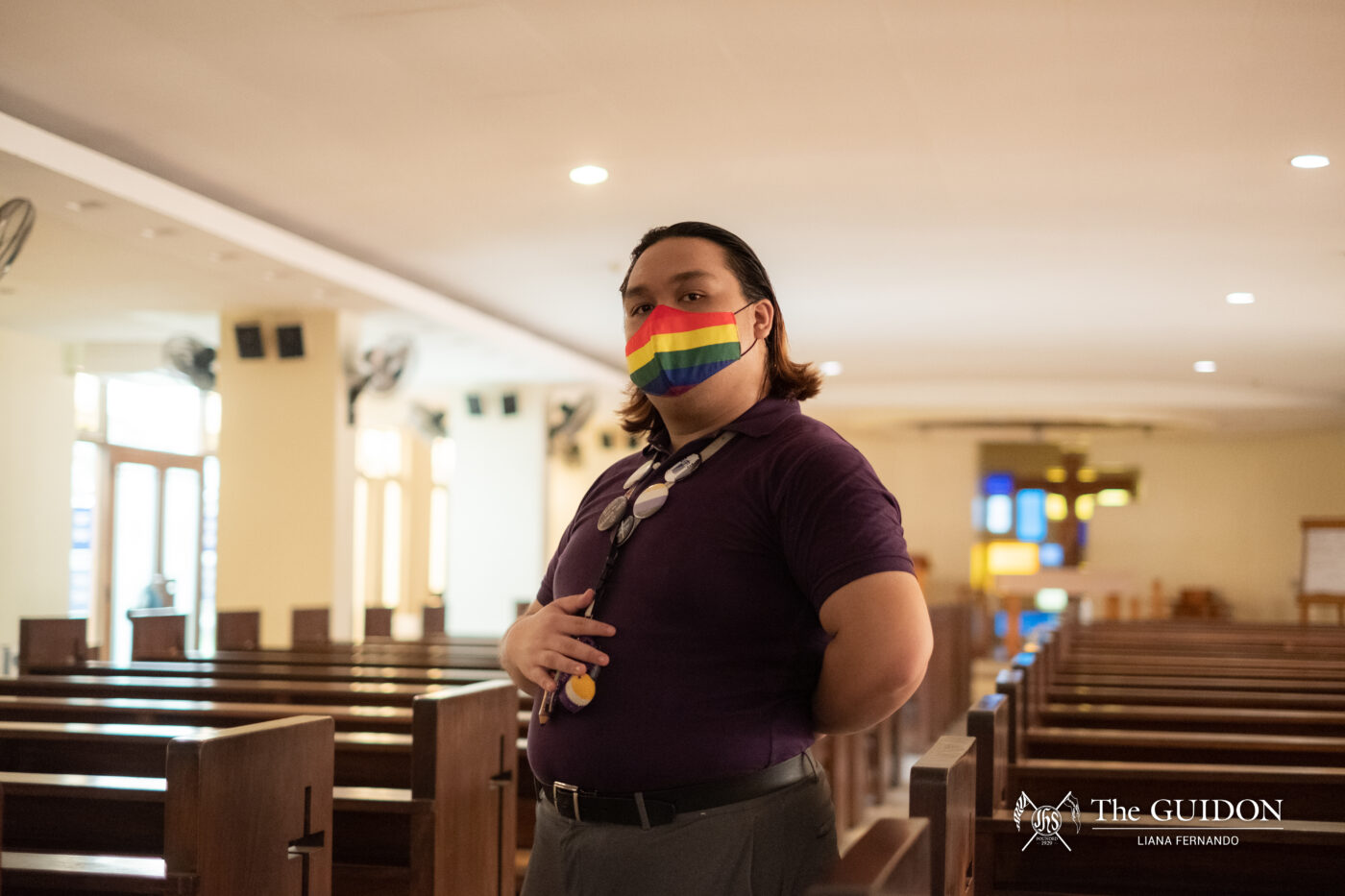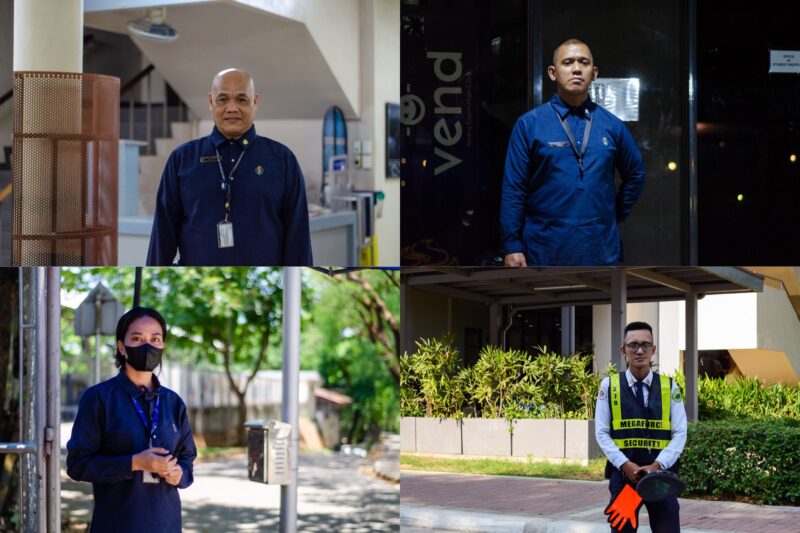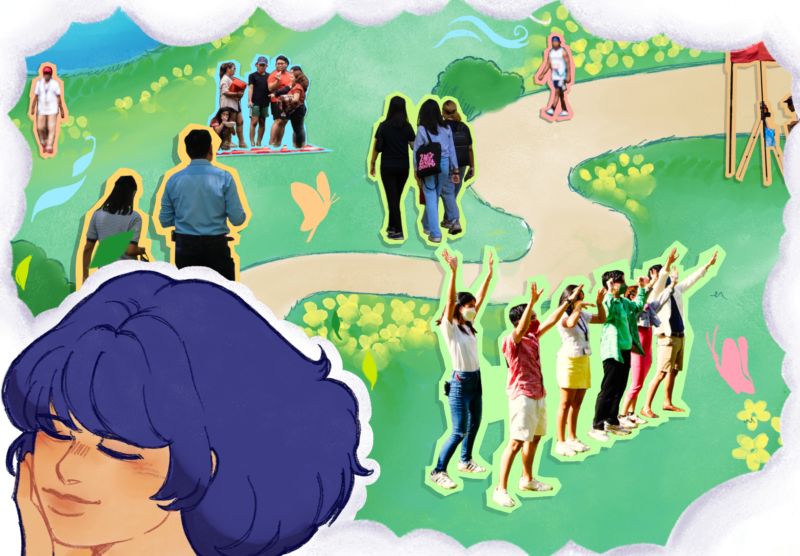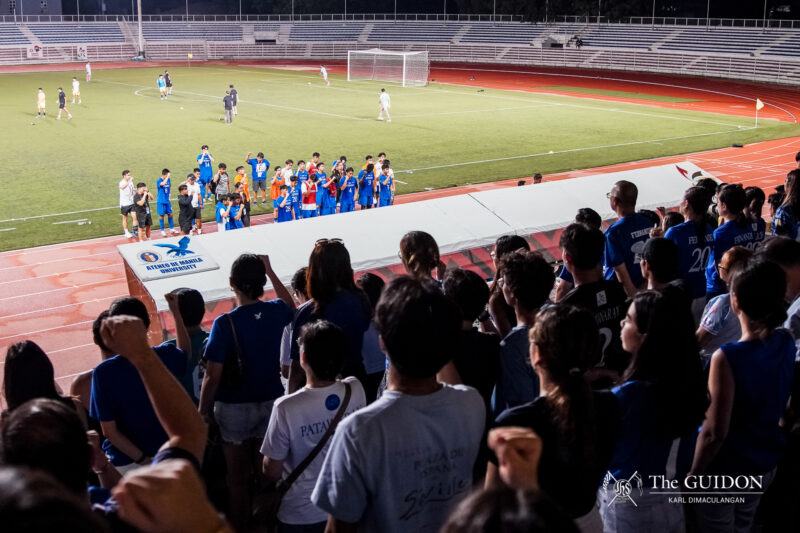Historically alienated by the Church, queer individuals and advocates invite religious institutions to embrace diverse human experiences of gender through meaningful dialogue.
FOR THE queer rights movement, the Church has undeniably been a powerful force to be reckoned with. In a predominantly Catholic country such as the Philippines, a lot of religious believers espouse preconceived notions that homosexuality is against Church dogma and teachings.
In pursuit of a gender-inclusive, gender-responsive, and gender-safe community within and beyond the Ateneo, both queer individuals and advocates demand that Catholic institutions engage in meaningful dialogue with the members to whom the Church has inflicted pain and hurt.

Alienation and exclusion
Loud and proud, M Dofitas (3 BS PSY) dons nonbinary and aromantic pins as they march through the school hallways. On special occasions, one might even find them wearing a Pride flag as a cape.
Dofitas uses the terms “asexual” and “agender” not as labels, but as descriptors. “I don’t really care, but I present whatever I feel, however I want. I don’t really think about it,” they clarify.
Being an assigned male at birth in a devoutly religious household, Dofitas endured the pressure from their family to appear masculine for most parts of their formative years. Like many of their friends from the LGBTQIA+ community, Dofitas suffered emotional and verbal abuse from religious believers for their non-conformity to the gender binary.
Over time, Dofitas internalized the patriarchy, a box that they admittedly continue to liberate themself from. However, amid the suppression and dehumanization of being shoved inside the closet, Dofitas “felt” they were queer the whole time.
As a culmination of their encounter with religious trauma and personal research, Dofitas now chooses “religious neutrality,” as someone who does not want to practice any religion or has relaxed leanings toward some gods.
While acknowledging the perils of demonizing the Church as a whole, Dofitas says that the Church hasn’t always been a loving institution for them.
Although the Church is beginning to undertake progressive efforts toward correcting bigoted doctrines, Dofitas points out that undertones of discrimination still exist in the Ateneo community. For instance, they are allowed to be queer, but with conditions.
Such personal anecdotes reflect the reality of the LGBTQIA+ community in general. They are culturally visible, yet the SOGIE Equality Bill remains languishing in legislation. For Dofitas, acceptance goes beyond mere tolerance—the absence of hatred. Rather, acceptance pertains to genuine compassion and love.
Regardless of their experiences of alienation and social exclusion, Dofitas declares that embracing their queerness has enabled them to live more authentically. “At the end of it all, I just want to be seen to be me. All I just want and need is that empathy [to be] what I identify as,” they share.
See eye to eye
In their search for more inclusive spaces, Dofitas considers the Ateneo a safe environment for queer individuals’ self-expression. Living a challenging life in a predominantly Catholic country, they find comfort in the University’s confines and its measures that allow for meaningful discourse on gender and sexuality.
The Ateneo has shown significant support towards the LGBTQIA+ community through its gender-fair initiatives, which include the establishment of relevant arms such as the University Gender Hub (UGH) and the development of the Code of Decorum and Administrative Rules on Sexual Harassment, Other Forms of Sexual Misconduct, and Inappropriate Behavior.
Additionally, Sanggunian Commission on Gender Equality Co-Commissioner Alliah Custodio shares that they have previously coordinated with the UGH and the University Gender and Development Office (UGDO) to ensure that the administration addresses gender-related concerns and allows graduating students to be recognized using their lived names.
However, Custodio acknowledges Ateneo’s potential to push the boundaries even further. Specifically, she emphasizes the importance of enlightening those who use Catholic teachings to spur hatred against queer individuals.
“People can be blind followers, [so] it becomes scary for LGBTQIA+ members to deal with biases that come with the Church’s understanding and interpretation of different sexual orientations,” she asserts.
While religious biases may appear unthreatening, they actually impact people’s perspectives and preconceived notions. A recent study showed a positive correlation between homonegativity and religiosity among heterosexual-identifying Filipinos. Furthermore, a Pew Research report revealed that 24% of Filipinos still believe homosexuality should not be accepted.
These observations can be attributed to the existing “weaponization” of religious freedom against gender equality efforts in the country, according to a paper published by Ateneo academics Jayeel Cornelio, PhD and Robbin Charles M. Dagle.
Despite its current antagonistic position, the concept of religious freedom can also be deemed essential in liberating the LGBTQIA+ community from society’s systemic discrimination. In another study, Cornelio and Dagle suggested that “reimagining a robust religious freedom” can lead people with different religious convictions to coexist out of mutual respect.
Doing so, however, might be burdensome in a country like the Philippines, known for disregarding human rights and democratic spaces. Thus, for Cornelio and Dagle, continued resistance and solidarity are crucial to genuinely freeing LGBTQIA+ Filipinos from oppressive forces.
Subsequently, Custodio sees the need for the Ateneo, as a Catholic academic institution, to bridge the gap between religion and gender. For instance, she and Dofitas appreciate their respective Theology of the Catholic Social Vision professors, who gave them hope that queerness and Catholicism may indeed reconcile.
Love, the greatest commandment
While positive strides for gender equality are realized within the Ateneo, spaces outside its four walls remain unsafe for the LGBTQIA+ community, amplifying the call to extend the University’s colorful celebration of love beyond the blue and white.
For Custodio, the Ateneo must leverage its influence and platform as a reputable university to challenge conservative ideologies through more liberal policies for queer individuals in the country.
Following this, Dofitas hopes the Ateneo will conduct more initiatives that involve both the Office of Campus Ministry and the UGH or UGDO. In doing so, the University can prompt discussions that help in finding commonalities among gender and religious beliefs, such as the emphasis on the expression of love.
As Pride Month concludes, both Dofitas and Custodio invite the Church and its constituents to open themselves up to diverse human experiences of gender. Dofitas cites that bigotry, like religion and gender, is learned behavior. Furthermore, they infer that perhaps bigots are victims themselves, consequently perpetuating the trauma cycle.
Ultimately, Custodio notes that more than just being a celebration, Pride must continue to be a form of protest. It must be a progressive platform that contributes to shaping a more inclusive society. After all, Dofitas believes that “the only people threatened by inclusivity are people embracing exclusivity.”
In the end, as an agent of change and transformation, the Church is challenged to engage in issues that crucify queer people, ensuring that its propagation of love is not exclusionary but emanates to one and all.







